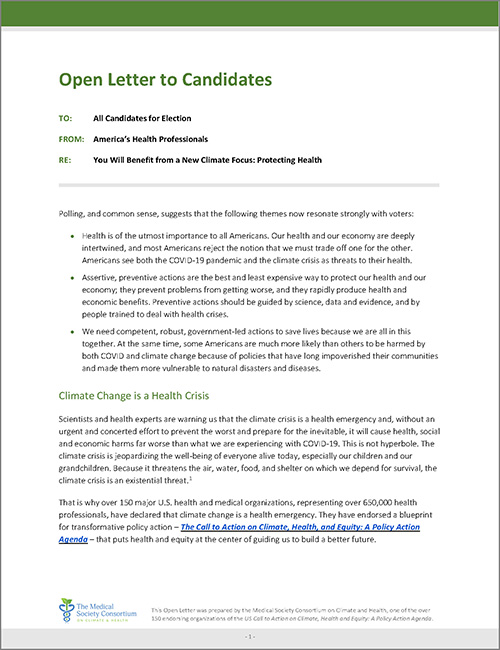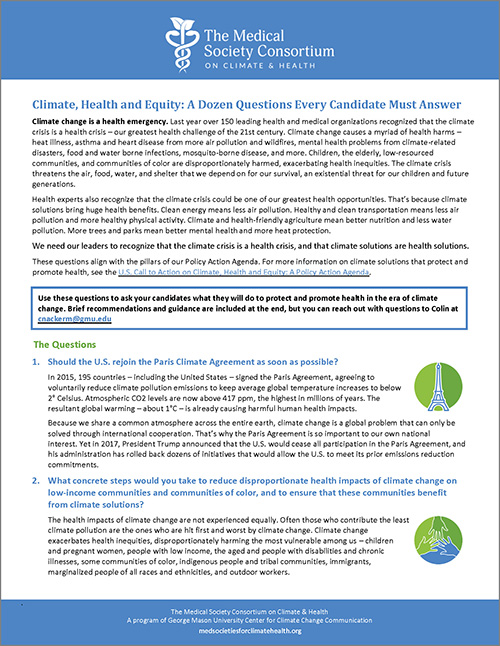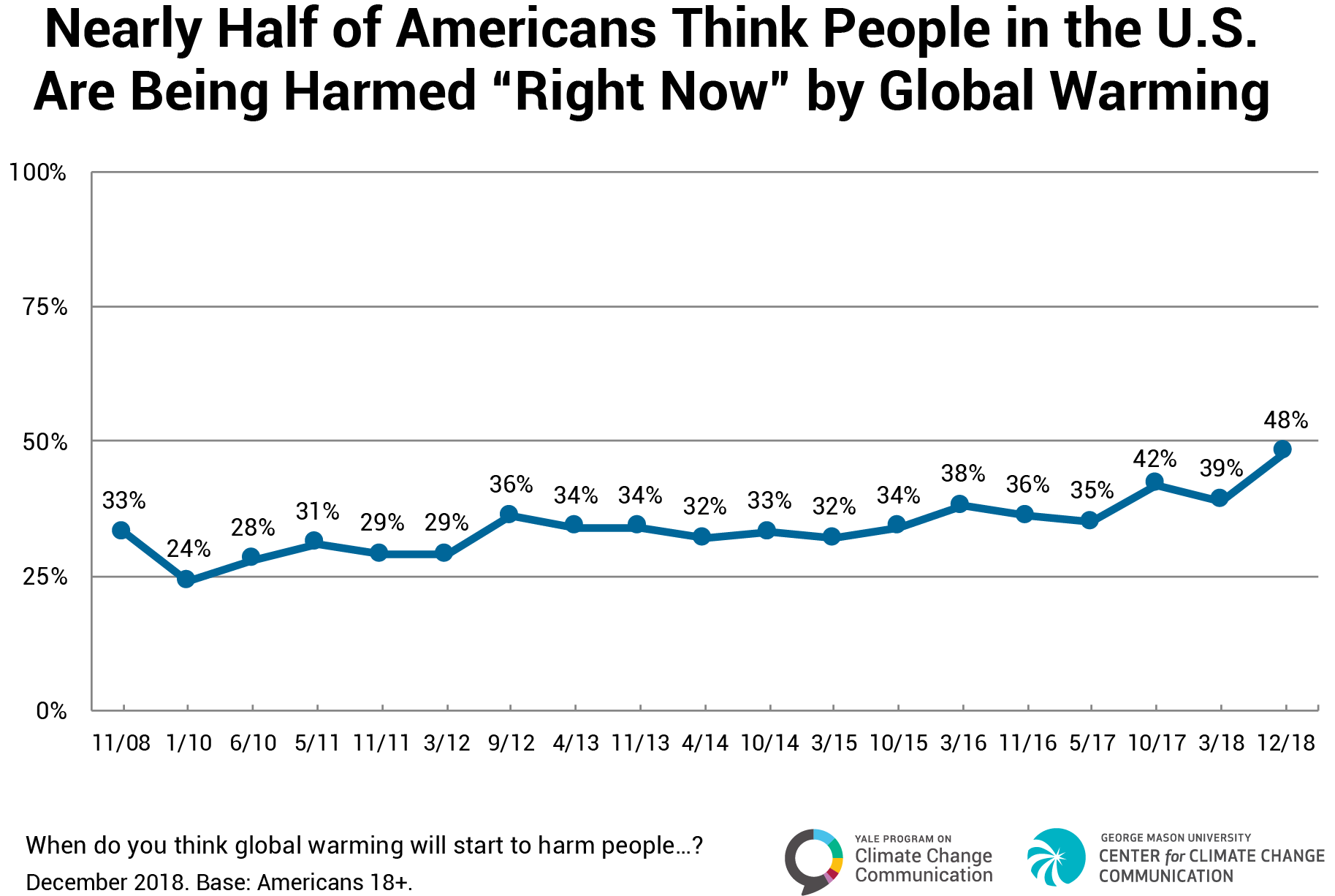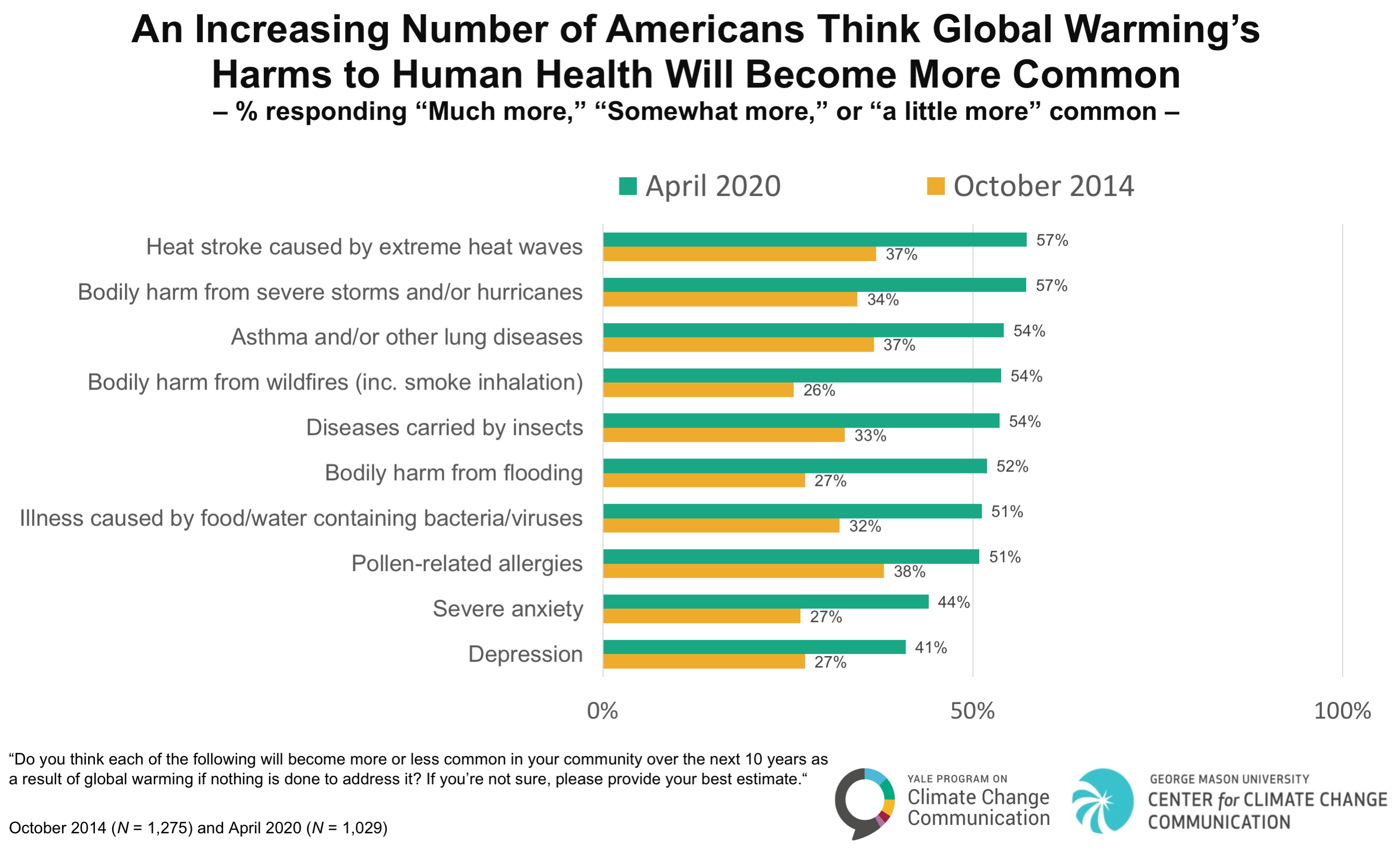An Open Letter to Candidates
The Consortium has developed materials to help focus attention on climate and health during the election season. This open letter, for all candidates for elected office and their advisors, is intended to build understanding that because climate change is a health emergency, and is increasingly recognized as a health threat by the American public, candidates should know that they can safely discuss climate change as a health threat and thus shield themselves from partisan crossfire.
We are eager to distribute the letter widely through Consortium member societies and individual members who lead policy for these societies. Perhaps your organization can identify ways to publicize and distribute this letter. Our hope is this letter could reach every candidate for office in America.
The full letter is available to read below and can be downloaded as a pdf. The pdf has been designed for health organizations to be able to add your name and logo, then distribute and publicize. To add your organization’s name and logo, follow these steps:
- Download the pdf and open it in Acrobat Reader. If you don’t have Acrobat Reader (it’s free), download here.
- Add your name: Type your organization name by clicking your cursor into the field box next to the text “FROM” on page 1.
- Add your logo: Mouse over the grey icon in the top right corner on page 1. A message will display “Click to add your logo”. Click the icon, and follow the prompts to add your logo. Save!
- Distribute this letter to your candidates, publicize on your website, and on social media.
 |
 |
| Download PDF – Open Letter to Candidates> |
Click here for more Voter Resources> |
TO: All Candidates for Election
FROM: America’s Health Professionals (or add your organization name here)
RE: You Will Benefit from a New Climate Focus: Protecting Health
Polling, and common sense, suggests that the following themes now resonate strongly with voters:
- Health is of the utmost importance to all Americans. Our health and our economy are deeply intertwined, and most Americans reject the notion that we must trade off one for the other. Americans see both the COVID-19 pandemic and the climate crisis as threats to their health.
- Assertive, preventive actions are the best and least expensive way to protect our health and our economy; they prevent problems from getting worse, and they rapidly produce health and economic benefits. Preventive actions should be guided by science, data and evidence, and by people trained to deal with health crises.
- We need competent, robust, government-led actions to save lives because we are all in this together. At the same time, some Americans are much more likely than others to be harmed by both COVID and climate change because of policies that have long impoverished their communities and made them more vulnerable to natural disasters and diseases.
Climate Change is a Health Crisis
Scientists and health experts are warning us that the climate crisis is a health emergency and, without an urgent and concerted effort to prevent the worst and prepare for the inevitable, it will cause health, social and economic harms far worse than what we are experiencing with COVID-19. This is not hyperbole. The climate crisis is jeopardizing the well-being of everyone alive today, especially our children and our grandchildren. Because it threatens the air, water, food, and shelter on which we depend for survival, the climate crisis is an existential threat.1
That is why over 150 major U.S. health and medical organizations, representing over 650,000 health professionals, have declared that climate change is a health emergency. They have endorsed a blueprint for transformative policy action – The Call to Action on Climate, Health, and Equity: A Policy Action Agenda – that puts health and equity at the center of guiding us to build a better future.
The Climate, Health and Justice Solutions Frame
While the health crisis that climate change has created is a daunting reality, the current context (pandemic, racial injustice and economic stress) also creates a big opportunity for a candidate who wants to offer voters a positive and achievable vision of a better future.
Our proposition is this:
Stand with doctors and other health experts on the need to address climate as a health crisis – a crisis that we can and must fight together, fight with great urgency, and fight in a way that advances social and racial justice. The promise is that we will not only avoid the worst harms of climate change, but will also be rewarded with improved health, sustainable prosperity, and a big step in the direction of racial and social justice.
Here are the answers to the questions we anticipate candidates will have:
1. How can I talk about climate change in the midst of a pandemic when people are so focused on struggles around their health, economic well-being and racial justice?
Public concern about the climate crisis is actually stronger than ever. Even in the midst of the COVID- 19 crisis that has received 24/7 news coverage for months, a recently released Yale/George Mason University poll2 shows that two out of three Americans are worried about global warming, and say the issue is personally important to them. Nearly half know that people in the U.S. are harmed now.

2. Are Americans concerned about climate and health?
The answer is, increasingly yes. The polls conducted by Yale and George Mason3 show that the majority of Americans understand that a range of health harms will become more common in their community – including heat stroke, injuries from storms, floods and wildfires, and diseases carried by insects – unless something is done about it.
That was not the case five years ago when the average American saw the health threats of climate change primarily as a problem in the future.

3. Americans are feeling greatly stressed by the pandemic, economic recession, and the social turmoil over racial injustice in every sphere of American life. How can talking about the health harms of climate change help, isn’t it just another doom and gloom issue?
COVID-19 is teaching us that voters are giving the highest marks to leaders who give them the facts, not happy-talk. They want unifying leaders who address issues, be they climate change or racial injustice, head on.
But more than anything, they want solutions that are equal in scale to the challenges posed by our biggest problems. They know that the truly promising solutions are the ones that solve many problems at once. In fact, the current crises are all inter-connected, not occurring in isolation. For example, communities with a history of racist redlining practices are at higher risk in extreme heat events. As with COVID-19, some people are more vulnerable to the health harms of climate change because of the work they do, their age, or their living conditions. People exposed to high levels of air pollution are at higher risk from COVID and from wildfire smoke; those living in poverty are more likely to be permanently displaced from their homes in a wildfire, flood or hurricane, or to live in overcrowded housing that increases COVID risk.
Fighting climate change cannot on its own solve the problems of racial injustice or persistent poverty, but it presents a chance to take a big step in the right direction. Solutions to climate change that are centered around respecting, listening to and prioritizing the health of the most impacted workers and communities are a concrete step toward justice in a low-carbon future.
Placing the protection of health at the center of climate action provides an opportunity to talk about the real and immediate health rewards of taking action – rewards that benefit everyone, and that reduce the significant burden of health care costs on our economy. That’s because climate solutions are health solutions. For decades, the leading causes of death and disability in the U.S. have been chronic diseases and injuries, caused by the same systems – transportation and land use, energy, and food and agriculture systems – that are primarily responsible for climate change and air pollution. Transforming these systems offers a triple win – for sustained community health improvement, for a better climate future, and for economic growth.
Moreover, the health benefits of climate solutions are also local. Communities, states, and nations that take climate action will rapidly benefit from cleaner air and water, better health, and greater prosperity. That’s why health experts around the world believe that climate solutions offer one of our greatest health opportunities. The key metrics for evaluating climate solutions are how much they will improve people’s health and how many lives they will save.
4. Reviving our economy will be one of – if not the most – important issues to voters in November. Opponents of climate action will say addressing climate change will hurt our economic recovery. How do I respond?
As is the case with COVID-19, pitting our response to climate change against recovering our economy is a false choice. While economic research has established the economic case for climate-focused transformation of our energy, transportation and agricultural sectors, health and safety considerations make the costs of inaction on climate change all too apparent. To cite one example, climate-related extreme events already cost billions every year in the U.S. The health costs alone are staggering – just 10 climate-sensitive events resulted in $10 billion in health-related costs.4
The case for transforming our approach to energy, transportation and agriculture gets even better when the health benefits of taking action are taken into account. Every step we take toward a cleaner, more sustainable future delivers a healthier population, accompanied by greater productivity and lower health costs.5
Even before they consider the health and health- cost benefits, the large majority of Americans already understand that “the environment versus the economy” is a false choice.6 Two-thirds (67%) say government action to address climate change will have a positive impact on the economy and jobs by encouraging businesses “to innovate and transition away from fossil fuels to clean alternatives,” and doing so will help the U.S. “expand its clean energy economy, create high-paying jobs, and put itself in a stronger position to compete in a world economy that is rapidly moving to renewable energy and zero-emission.”
What We Want: Champions for Climate, Health, Justice and Sustainable Prosperity
We want our elected officials and those running for office to prioritize the protection and promotion of health for every American, present and future. Commitment to this priority is embodied by the broad consensus that the health community has put forward in the Climate, Health, and Equity Policy Action Agenda, which is strongly aligned with other proposals now being discussed in the public domain in the context of COVID recovery.
We want all candidates to know that making that commitment – becoming a climate, health and justice champion – is a winning strategy with many voters and a losing one with vanishingly few. We submit that candidates should not miss this opportunity to link the four issues that are most salient to the public right now – health, social and racial justice, the threat of climate change, and rebuilding the economy – by providing a compelling vision of rebuilding toward a healthier, greener, more equitable and resilient America.
Big Solutions Address More than One Problem
It is a truism of Presidential election cycles to say that voters are looking for leaders who can help us come together to solve our problems. What is unique to this cycle is the scale of the challenges that confront us – the pandemic’s intersection with racial injustice that underlies its disproportionate impact on Black and Latinx people, a deepening economic crisis, and the ever-worsening threat of climate change. To be relevant, candidates must offer “big solutions” to these problems. Going to the moon in the 60’s was about exerting leadership, exciting patriotism, advancing science and competing against a global rival. Solving climate change is perhaps our biggest long-term challenge, but health, racism and economic recovery are deep and immediate concerns. Progress requires tackling these problems with remedies that address them all, namely sustainable approaches that improve health, redress injustice, and revive the economy.
In a health crisis, we are all in it together because the health of others affects our own health and well-being. But some of us are more vulnerable simply because of where we live, what work we do, or what injustices we have suffered.
***
REFERENCES
1. https://www.ipcc.ch/sr15/
2. https://www.climatechangecommunication.org/all/americans-increasingly-understand-that-climate-change-harms-human-health/
3. https://climatecommunication.yale.edu/publications/climate-change-in-the-american-mind-april-2020/2/
4. https://agupubs.onlinelibrary.wiley.com/doi/full/10.1029/2019GH000202
5. https://www.thelancet.com/pdfs/journals/lancet/PIIS0140-6736(19)32596-6.pdf
6. https://climatenexus.org/wp-content/uploads/pdf/American-Voters-Support-Climate-Action.pdf
***
This Open Letter was prepared by the Medical Society Consortium on Climate and Health, one of the over 150 endorsing organizations of the US Call to Action on Climate, Health and Equity: A Policy Action Agenda.
